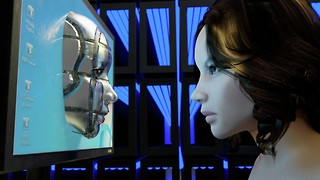Theatre: Beast
This passionate and unusual tale of an artist and his muse bewitches Rebecca Rosenberg

Elena Bolster’s Beast is an hour of verse-driven back and forth between the two protagonists, one a swaggering artist, the other his sultry muse. The piece charts their relationship from their initial meeting on a ship up until their final tragic exchanges. Both characters are portrayed excellently throughout by Laura Waldren and Sam Grabiner; crucially, the actors also engage with the heady atmosphere of the play.
The first scene of the play sees the protagonists meet but the audience does not hear their actual interaction. Instead their dialogue consists of inner narratives describing the exchange. They describe each other and comment on their meeting. However the audience can see the looks and the dance-like movements between the two. This form of self-referential narrative continues throughout the play, intertwining seamlessly and effectively with moments of actual interaction between the two protagonists.
The inner narrative provides an unusual dynamic to the piece, often leading to moments of ludic humour. The audience also sees the diverging narratives of the two characters in moments of frustration revealing the complexities of relationships: the artist complains about his muse’s smoking and drinking, the muse describes how enthralled and obsessed he is with her. Despite the inner narratives, the protagonists interact coherently with each other. Their inner narratives often coincide and mirror each other, such as when they both state “I am bewitched.” The physical interaction between the two actors, particularly their eye contact, creates this heady, tense atmosphere on stage.
The language and verse of the play is heavily sensory. The descriptions of his painting process and the idea of immortalising her on canvas are visceral; the two actors perform with passion and add a sense of carnality to the potent dialogue. The helpless frustration of the two as the painter’s health deteriorates is rendered emotively by both actors, from moments of painful quiet to crescendos of screaming and aggression. Both fully immerse themselves in these scenes of tragic physical decay. The final moments of the play propose an impossibly difficult decision, where the actors’ skills are at their peak in the juxtaposition of the artist’s suffering and the muse’s love, presenting the heart-wrenching zenith of the piece.
In addition to the actors, the production, the accompanying harpist and the stage all help to create an ambient snapshot of bohemian life. Beast is an enthralling piece; the two actors are to be congratulated for not only performing the lyrical verse with aplomb but also giving themselves over to the tense and tragic passion that defines this piece.
 Comment / Are degrees still worth it?4 August 2025
Comment / Are degrees still worth it?4 August 2025 News / Cambridge Folk Festival to relaunch in 20265 August 2025
News / Cambridge Folk Festival to relaunch in 20265 August 2025 Sport / ‘A full-time job with overtime’: should disparities change the way we approach Bumps?6 August 2025
Sport / ‘A full-time job with overtime’: should disparities change the way we approach Bumps?6 August 2025 News / Two arrested after death of Cambridge language school student 4 August 2025
News / Two arrested after death of Cambridge language school student 4 August 2025 Features / Selling the Cambridge experience: private summer programmes in the historic university 3 August 2025
Features / Selling the Cambridge experience: private summer programmes in the historic university 3 August 2025









